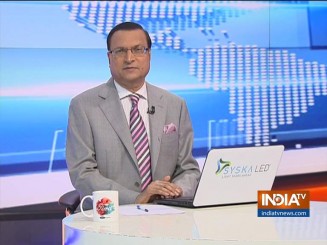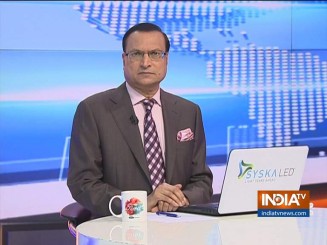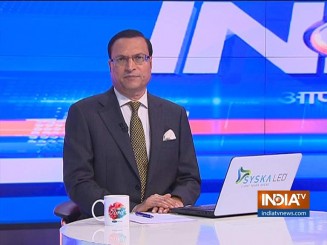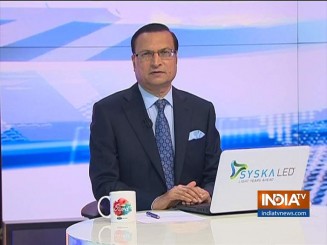How Uddhav Thackeray was ‘blinded by affection’ for his son
 On Monday when Shiv Sena walked out of the National Democratic Alliance and went to the Maharashtra Governor to stake its claim to form a government, it had no letter of support in hand – neither from the Nationalist Congress Party, nor from the Congress. All that the leaders had were mere words of assurance from leaders of these two parties.
On Monday when Shiv Sena walked out of the National Democratic Alliance and went to the Maharashtra Governor to stake its claim to form a government, it had no letter of support in hand – neither from the Nationalist Congress Party, nor from the Congress. All that the leaders had were mere words of assurance from leaders of these two parties.
Understandably, the Governor refused to give the Shiv Sena more time to cobble up a coalition, and instead, asked the third largest party, NCP, to explore ways of government formation. The situation is still fluid as the Congress high command continues to dither, grappling with doubts.
I think it was Shiv Sena chief Uddhav Thackeray’s ’putramoha’ (blind affection for son) that did the party in. Uddhav wanted to see his son Aaditya Thackeray anointed as chief minister, by hook or by crook – for two and a half years (with the BJP), or for two and a half months, or even for two and a half days. During the recent assembly polls, Uddhav had gone to town telling voters that it was his father Balasaheb Thackeray’s last wish to see a member of the family become the chief minister of Maharashtra. Gone were the days when Balasaheb used to publicly boast about carrying a ‘remote’ to guide the likes of Manohar Joshi as chief minister.
It was because of this ‘blind affection’ for his son that Uddhav walked out of an alliance with BJP that had continued for 25 consecutive years in Maharashra, from 1989 till 2014, and later during the recent assembly polls. Both the Shiv Sena and BJP had campaigned across Maharashtra during last month’s elections, denouncing both the NCP and Congress.
On Monday, Uddhav Thackeray had to suffer the humiliation of going to meet NCP supremo Sharad Pawar to seek his party’s support, at a hotel in Mumbai, and had to telephonically request Congress President Sonia Gandhi seeking her party’s support.
Uddhav agreed to do all that the prospective partners wanted him to do. His party walked out of the NDA and his minister Arvind Sawant at the Centre tendered his resignation. At the hotel, Sharad Pawar offered him tea, but no letter of support. Sharad Pawar is a seasoned politician. He always plans ten steps ahead before giving any commitment.
On Monday night, there was this strange spectacle of Sharad Pawar’s nephew Ajit Pawar and his associates being invited by the Governor to explore ways of forming a government. Till Monday evening, Shiv Sena was claiming support of NCP, and by night, it was Shiv Sena which was being asked to think about offering support to NCP. The roulette of Maharashtra politics has now taken a 180-degree turn.
The issue is not of morality, but lust for power. The BJP cannot blame the Shiv Sena on the issue of morality. It was only last month that the BJP had formed a coalition government in Haryana with Dushyant Chautala’s party. The Congress, too, cannot claim a higher pedestal, because it had formed a government in Karnataka last year with Devegowda’s Janata Dal(S), but the alliance came unstuck.
The main reason behind Congress’ refusal to endorse the Shiv Sena-led coalition government was that senior party leaders were apprehensive about losing support of Muslim voters in the event of forging an alliance with the Shiv Sena. These leaders were openly speaking about possible repercussions among Muslim voters in Kerala, Karnataka, Bihar, West Bengal and Uttar Pradesh.
The biggest loser was, of course, the Shiv Sena, and its leader Uddhav Thackeray. In Hindi, there is a saying: ‘Duvidha mein dou gaye, Maya mili na Ram’. (In confusion, you lose both – materially and spiritually)
Click Here to Watch Full Video| Get connected on Twitter, Instagram & Facebook
Lawyers must curb the tendency to resort to violence
 A minor quarrel over parking issue between a policeman and a lawyer outside Tees Hazari court in Delhi on Saturday escalated into violent clashes between the policemen and lawyers in the court premises. Police resorted to lathi charge and firing, advocates were beaten up and the lawyers set fire to vehicles.
A minor quarrel over parking issue between a policeman and a lawyer outside Tees Hazari court in Delhi on Saturday escalated into violent clashes between the policemen and lawyers in the court premises. Police resorted to lathi charge and firing, advocates were beaten up and the lawyers set fire to vehicles.
The Delhi High Court on Sunday directed immediate transfer and suspension of police officers and ordered a probe. On Monday, lawyers in Delhi went on strike, but several video clips that appeared on social media tell a different story. One video clip showed a group of lawyers entering the police control room at Saket court and vandalizing it. Another clip showed a lawyer beating up a policeman who had gone there for some court work. A few litigants who had come to court were beaten up by some lawyers.
All these videos are shocking, to say the least. If one looks at the videos made by lawyers showing the police beating up advocates, it will appear as a police excess. But if one looks at video clips in which lawyers beat up policemen and vandalized police control room, then it tells the other side of the story. The Chief Justice of Delhi High Court sat on Sunday and gave directions against the police. None of the lawyers were arrested, but police offers were suspended or transferred. An independent committee headed by a retired High Court judge was set up to probe the Tees Hazari violence.
In view of this, the lawyers should have exercised restraint and waited for the probe report to come. To the best of my knowledge, most of the lawyers in Delhi supported the High Court’s directives. On the other side, these incidents have caused demoralization in the police force. The IPS officers’ association tweeted that police officers across India stand in solidarity with policemen subjected to physical assault and humiliation.
The incidents that happened on Monday outside Saket court could have been avoided. The video of lawyers beating up a policeman brings a bad name to the legal community, and this act cannot be justified. Incidentally, Bar Council elections are going to be held now, and it appears that some of the lawyers are misusing these incidents to incite their brethren and garner votes.
I have spoken to some senior advocates and they have unequivocally said that such tendencies need to be curbed. The common man seems to be perturbed after seeing lawyers thrashing policemen. If the morale of policemen takes a hit, who will protect the city, this capital and this country?
Click Here to Watch Full Video| Get connected on Twitter, Instagram & Facebook
Why Imran Khan is suffering from Modiphobia ?
 The leader of Pakistan’s largest religious party Maulana Fazlur Rehman has given two days ultimatum for Prime Minister Imran Khan to resign.
The leader of Pakistan’s largest religious party Maulana Fazlur Rehman has given two days ultimatum for Prime Minister Imran Khan to resign.
Addressing a huge rally in Islamabad attended by Pakistan People’s Party leader Bilawal Bhutto and Pakistan Muslim League (N) leader Shahbaz Sharif, the firebrand cleric indirectly criticized the army alleging that Imran Khan’s party has not come to power on a popular mandate “but on someone else’s direction”.
The Maulana said, Imran Khan’s government has failed to curb rising prices and rampant unemployment and has proved incompetent in reviving an economy which is on the decline. Hours later, the Imran Khan government rejected the demand for resignation, even as senior opposition leaders from PPP and PML(N) were closeted with the Maulana at the latter’s residence to decide about the future of the agitation.
On Friday, Prime Minister Imran Khan was in Gilgit Baltistan, where he alleged that the Maulana was speaking like “an Indian national”. He vowed to send all corrupt politicians to jail, and recited Islamic verses to seek support from the people.
Imran Khan said, the very name of Pakistan is “La Illaha Illaha” (God is Great). He then went on to describe how Islam spread from the Middle East under Prophet Mohammed’s leadership, subduing two big empires of Europe.
Imran then hit out at Indian Prime Minister Narendra Modi alleging that Kashmiris are being suppressed in the valley. The Pakistani PM said,”Modi has played his last card (on Kashmir). The moment curfew is lifted, a sea of people will come out on the streets to demand azadi”.
Clearly, Imran Khan is suffering from Modiphobia. He may not be aware but it is a fact that on Friday, the first day of Jammu & Kashmir as a union territory, markets in several localities of Srinagar were open and traffic was normal.
The fact is that Pakistanis on the streets of Islamabad are demanding ‘azadi’ from Imran Khan’s rule. But since the Pakistani PM is suffering from Modiphobia, he is mentioning Modi, Kashmir and India in all his speeches. And now, Imran Khan has added Islam in his speeches to regain his fast losing support among the common people. He is trying to project himself as a Maulana better than the real one.
On the situation in Kashmir, Imran Khan appears to be totally off the mark. He is daydreaming about millions of Kashmiris coming out on the streets, but the fact is that on Friday, the shops were open, people were busy shopping and there was normal traffic on the roads. Clearly, his advisers are misleading him. Imran Khan may change his outlook if he gives a close look at the ground realities in Kashmir.
Click Here to Watch Full Video| Get connected on Twitter, Instagram & Facebook
Why PM said, revoking Article 370 was a fitting tribute to Sardar Patel
 On the birth anniversary of India’s first Home Minister Sardar Vallabh Bhai Patel on Thursday, Prime Minister Narendra Modi told a gathering at Kevadiya, Gujarat, that the revocation of Article 370 granting special status to Jammu & Kashmir was a fitting tribute to the memory of the ‘Iron Man’.
On the birth anniversary of India’s first Home Minister Sardar Vallabh Bhai Patel on Thursday, Prime Minister Narendra Modi told a gathering at Kevadiya, Gujarat, that the revocation of Article 370 granting special status to Jammu & Kashmir was a fitting tribute to the memory of the ‘Iron Man’.
Speaking to people at the feet of the world’s tallest statue of Sardar Patel, Modi said, ‘Article 370 had created a wall in Kashmir promoting separatism and terrorism, and I am here today to humbly tell Sardar Patel that the wall has been demolished. I dedicate the August 5 decision to revoke Article 370 to the memory of Sardar Patel.’
India’s first Home Minister holds the distinction of merging 565 princely states in the Indian Union. He completed his task successfully leaving no room for future dispute. India’s first Prime Minister Pandit Jawaharlal Nehru had taken the responsibility of merging Jammu & Kashmir in the Indian Union. Nehru decided to give special status to J&K under Article 370 along with a separate flag and a separate Constitution. Patel had opposed the move at that time. He wanted a united and secure India, but the Kashmir dispute continued to be a vexed problem for the last 72 years.
For more than 70 years, none of the governments at the Centre mustered the courage to revoke Article 370 and Article 35A that gave the J&K government special powers under a separate Constitution. J&K continued to exist with a separate flag, a separate Constitution and separate emblem. It was Prime Minister Narendra Modi who showed the courage to revoke these articles from the Constitution and integrated J&K with the rest of India. This is certaintly the biggest tribute to the memory of Sardar Patel and all credit should go to Modi for achieving this feat.
It was a coincidence that on the birth anniversary of Sardar Patel, Jammu & Kashmir was formally bifurcated on Thursday as two new union territories of the Indian Union. The event was hailed by PM Modi who said this move would bring political stability and end corruption in Jammu & Kashmir and Ladakh.